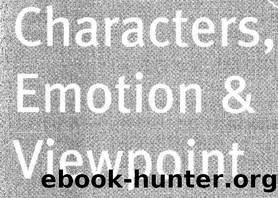tmp5819 by Unknown

Author:Unknown
Language: eng
Format: mobi
backstory. The character who says, "I've loved you ever since I first saw you, which was when we met in the eighth grade the year after my mother died," has just made an ass of himself. And, alas, of you. During emotional moments, characters should concentrate on the moment.
Whether your characters talk about their emotions or only think about them, emotions are the heart of fiction. Pulitzer Prize-winner Edna Ferber went so far as to say, "I think that in order to write really well and convincingly, one must be somewhat poisoned by emotion. Dislike, displeasure, resentment, fault-finding, imagination, passionate remonstrance, a sense of injusticeâ they all make fine fuel." You may not want to go so far as to be "poisoned" by emotion, but if you can enter into your characters' feelings, their expressions of emotion will gain authenticity and fire. In other words, become your characterâat least as you write him.
Then read the scene again and become your reader.
Emotional dialogueâwhat feelings a character expresses and in what wordsâ is determined not only by basic temperament but also by ethnicity, family training, region, education, gender, and particular circumstances. In addition, people speak differently about an emotional event after it's over. Paying attention to all these differences can both enhance your character's plausibility and also build characterization.
Fictional dialogue differs from real-life dialogue by being shaped through compression, understatement, or emphasis. For maximum effect, you should employ slang, profanity, and dialect sparinglyâpossibly more sparingly than your character would use them in real life. Avoid overwriting, cliches, and as-you-know-Bob exposition in dialogue; all undermine readers' responses.
Choose carefully to whom your character talks emotionally and when; it indicates personality. So do her thoughts (talking to herself)- Characters' emotional thoughts can be used to show sides of her that her actions and dialogue do not, deepening the reader's total perception of her personality.
Exploiting a character's "breaking point," a dramatically effective use of dialogue, requires portraying both the pressures on him and his previous self-control.
Tape-record a short conversation with a friend or relative. (Note: In some states, you must have the other person's permission to do this legally.) Transcribe the results. How would they need to be compressed, emphasized, explained, or otherwise rewritten to work as fictional dialogue? Rewrite the conversation.
Imagine that six people you know are told, each privately, that they have inherited a billion dollars. Write down the first thing each person would say, in your opinion. Study the results. Are they in keeping with what you know of each person's broader character? How can you alter the dialogue to better build characterization while still staying true to the original personality?
Write an intense argument between two people, exclusively in dialogue. Now write a diary entry for each participant, giving his or her thoughts on the fight. How do their emotional reactions differ? What words do they use to express them?
Ride a bus, walk through a mall, or hang around a park. Eavesdrop on conversations. (Try not to look like a suspicious character while doing this.
Download
This site does not store any files on its server. We only index and link to content provided by other sites. Please contact the content providers to delete copyright contents if any and email us, we'll remove relevant links or contents immediately.
Machine Learning at Scale with H2O by Gregory Keys | David Whiting(4312)
Never by Ken Follett(3954)
Harry Potter and the Goblet Of Fire by J.K. Rowling(3856)
Fairy Tale by Stephen King(3394)
Unfinished: A Memoir by Priyanka Chopra Jonas(3388)
The Man Who Died Twice by Richard Osman(3077)
Will by Will Smith(2919)
It Starts With Us (It Ends with Us #2) by Colleen Hoover(2367)
Rationality by Steven Pinker(2363)
Can't Hurt Me: Master Your Mind and Defy the Odds - Clean Edition by David Goggins(2339)
The Dark Hours by Michael Connelly(2307)
The Storyteller by Dave Grohl(2234)
Friends, Lovers, and the Big Terrible Thing by Matthew Perry(2230)
The Dawn of Everything: A New History of Humanity by David Graeber & David Wengrow(2208)
The Becoming by Nora Roberts(2201)
The Stranger in the Lifeboat by Mitch Albom(2120)
Cloud Cuckoo Land by Anthony Doerr(2110)
Love on the Brain by Ali Hazelwood(2074)
Einstein: His Life and Universe by Walter Isaacson(2021)
